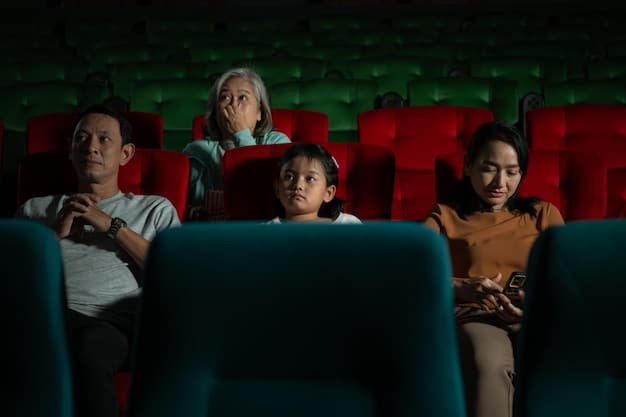New Law in Brazil: 20% Screen Time for National Films – Will It Succeed?

A new law in Brazil mandates that 20% of screen time in cinemas must be dedicated to Brazilian films. This initiative aims to support and promote the country’s film industry, but its effectiveness remains a topic of discussion and debate.
Brazil has recently implemented a new law that could significantly impact its film industry and moviegoers. The new law mandates 20% screen time for Brazilian films in the nation’s cinemas. This initiative raises important questions.
Will this new law mandating 20% screen time for Brazilian films truly support local productions and cultivate a thriving cinematic landscape? Or will it lead to unintended consequences, such as reduced audience choice and potential strain on theaters? Let’s delve into the details and explore the potential outcomes. Is this a game changer, or a well-intentioned plan with unforeseen pitfalls?
Understanding the New Law Mandating 20% Screen Time for Brazilian Films
The new law mandating 20% screen time for Brazilian films marks a significant effort to bolster the national film industry. It requires cinema operators across Brazil to allocate a minimum of 20% of their screen time to domestically produced movies. This initiative aims at increasing the visibility and reach of Brazilian cinema, ultimately fostering a more vibrant and sustainable local industry.
The Rationale Behind the Legislation
Several factors motivated the implementation of this law. They include the desire to promote cultural identity, support local filmmakers, and ensure that Brazilian stories are told on the big screen. Government authorities are hoping that this quota will encourage the production of more Brazilian films and attract larger audiences to watch them.
- Boosting Cultural Identity: Providing a platform for Brazilian stories and cultural expression.
- Supporting Local Filmmakers: Creating a more stable and predictable market for Brazilian films.
- Increasing Audience Exposure: Ensuring that audiences have the opportunity to see Brazilian films in theaters.
By mandating screen time, the government aims to level the playing field, giving Brazilian films a better chance against the dominance of Hollywood blockbusters. The new law mandating 20% screen time for Brazilian films: is seen as a way to ensure that Brazilian cinema continues to thrive and evolve.

Potential Benefits of the 20% Screen Time Quota
The new law mandating 20% screen time for Brazilian films could bring several advantages to the Brazilian film industry and the wider cultural landscape. By guaranteeing a certain level of exposure, local filmmakers stand to benefit from increased opportunities and revenue. Additionally, the law is expected to promote cultural diversity and provide audiences with a broader range of cinematic experiences.
Economic Advantages for the Film Industry
With a guaranteed 20% screen time, Brazilian films have a better chance to generate revenue, attracting investment and encouraging more productions. This stability helps Brazilian filmmakers develop more ambitious projects and compete effectively in the global market.
The financial advantages are substantial. Increased revenue streams can lead to:
- More local film productions each year.
- Higher budgets, attracting top talent and expertise.
- Greater potential for international recognition and distribution.
This economic stimulus could result in a flourishing film sector, creating jobs and supporting related industries.
Cultural Enrichment and Diversity
The new law mandating 20% screen time for Brazilian films ensures that local stories are told on the big screen, fostering cultural identity and diversity. By showcasing a variety of Brazilian narratives, audiences have the opportunity to connect with their heritage, reflect on social issues, and develop a deeper understanding of their country. It’s important to see cultural representation on screen.
The cultural impact includes:
- Preserving and promoting Brazilian cultural heritage through film.
- Offering audiences diverse perspectives and experiences.
- Encouraging filmmakers to explore unique and authentic stories.
Ultimately, this leads to a richer cinematic ecosystem that reflects the diversity of Brazilian society.
Challenges and Concerns Surrounding the New Law
While the new law mandating 20% screen time for Brazilian films is intended to support the local industry, it also presents several challenges and raises some concerns. These include potential constraints on cinema operators, limited audience choices, and ensuring the quality of mandated productions. Addressing these issues is crucial for the law’s long-term success.
Constraints on Cinema Operators
Cinema operators might face difficulties in meeting the 20% quota, especially if there are not enough high-quality Brazilian films available to fill the screen time. This could lead to reduced flexibility in scheduling and potential conflicts with audience preferences.
Potential Impact on Audience Choice
Some critics argue that the new law mandating 20% screen time for Brazilian films could limit audience choice by reducing the number of screens available for international films. Smaller independent cinemas, in particular, fear that the law may lead to a decrease in popular international films. This leads moviegoers to feel as if their choice is limited.
Ensuring Quality and Diversity in Brazilian Cinema
One of the key considerations for the success of the new law mandating 20% screen time for Brazilian films is to ensure that the mandated productions are of high quality and represent a diverse range of genres and stories. This requires investment in film education, support for independent filmmakers, and the creation of a sustainable ecosystem that fosters creativity and innovation.
Investing in Film Education and Talent Development
To produce high-quality films, it is essential to invest in film education and talent development programs. This ensures that aspiring filmmakers have the skills and resources they need to create compelling and engaging stories.
Investments should focus on:
- Establishing film schools and workshops.
- Offering grants and scholarships for filmmakers.
- Providing mentorship opportunities and industry connections.
These initiatives will help cultivate a new generation of Brazilian filmmakers who can compete on the global stage. Supporting upcoming filmmakers will help create new types of films.

Promoting Independent Filmmakers
Independent filmmakers often bring unique perspectives and innovative storytelling to Brazilian cinema. Supporting these filmmakers through funding, distribution platforms, and festival exposure is crucial for maintaining diversity and creativity in the industry. The new law mandating 20% screen time for Brazilian films intends to focus on promoting independent films from Brazil.
The Future of Brazilian Cinema Under the New Law
The new law mandating 20% screen time for Brazilian films: Will It Work? The effectiveness of the new law will depend on several factors, including the quality and diversity of Brazilian films, the response from cinema operators and audiences, and the level of government support and regulation. By addressing the challenges and maximizing the benefits, Brazil can create a thriving and sustainable film industry that contributes to the nation’s cultural and economic prosperity.
Monitoring and Evaluation
Regular monitoring and evaluation are essential to assess the impact of the law and make necessary adjustments. Analyzing audience attendance, revenue generation, and the quality of films produced under the quota can provide valuable insights into the law’s effectiveness.
Evaluation should encompass:
- Audience surveys and feedback.
- Data on film production and distribution.
- Economic impact assessments.
This iterative process will ensure that the law continues to meet its objectives and adapt to the evolving needs of the film industry. The new law mandating 20% screen time for Brazilian films could be effective with proper evaluation of the law.
Encouraging International Collaboration
Collaborating with international filmmakers and distributors can help expand the reach of Brazilian cinema and attract new audiences. Co-productions, joint ventures, and international film festivals can provide valuable opportunities for Brazilian filmmakers to showcase their work and learn from global best practices. The new law mandating 20% screen time for Brazilian films may encourage these collaborations.
| Key Point | Brief Description |
|---|---|
| 🎬 Screen Time Mandate | Brazilian cinemas must allocate 20% of screen time to Brazilian films. |
| 💰 Economic Benefits | Increased revenue for local filmmakers leads to more productions. |
| 🌍 Cultural Enrichment | Promotes Brazilian culture and diverse storytelling. |
| 🤔 Challenges | Cinema operators may struggle to meet the quota if there’s a lack of quality Brazilian films. |
Frequently Asked Questions
The law requires Brazilian cinemas to dedicate a minimum of 20% of their screen time to showcasing domestically produced films, aiming to boost the local film industry.
The law was introduced to promote cultural identity, support local filmmakers, and ensure that Brazilian stories are told on the big screen, countering the dominance of Hollywood productions.
Cinema operators could face challenges in meeting the quota, especially if there aren’t enough high-quality Brazilian films to fill the mandated screen time, leading to scheduling and audience preference conflicts.
Some critics argue that the law may reduce the number of screens available for international films, thus limiting audience options and negatively impacting smaller, independent cinemas.
Investments are being made in film education, talent development programs, and support for independent filmmakers to ensure high-quality productions and promote creativity and diversity in the industry.
Conclusion
The new law mandating 20% screen time for Brazilian films represents a bold step towards supporting the local film industry and promoting cultural diversity. While challenges and concerns exist, its success hinges on ensuring quality productions, providing adequate support to filmmakers, and continuous monitoring and evaluation. With careful implementation and adaptation, this law has the potential to enrich Brazilian cinema and contribute to the nation’s cultural identity and economic prosperity.





